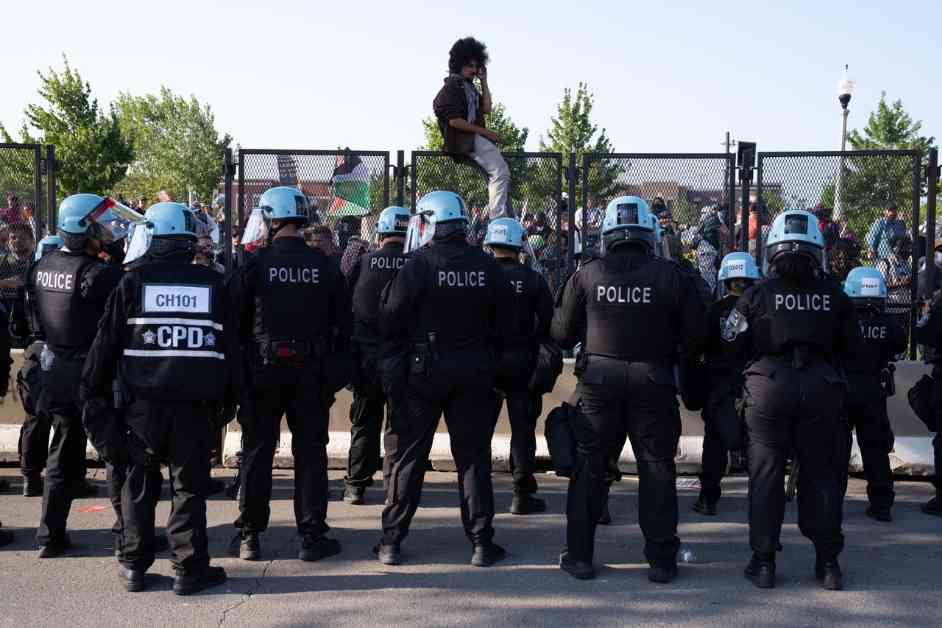Chicago Protest Turns Violent: 13 Arrested for Breaking Barricades and Attacking Police
A peaceful protest in Chicago organized by the Coalition to March on the DNC turned violent on the 19th, resulting in the arrest of 13 individuals for various offenses, including breaking down security barricades near the United Center. Chicago Police Department Chief Larry Snellin provided details of the incident, stating that a small group of individuals dismantled and removed the safety barriers near 578 Park. Some of the protesters then proceeded to throw objects at police officers and even sprayed pepper spray at them. However, the police, equipped with riot gear, quickly took control of the situation. By the afternoon of the 20th, 13 people had been arrested, with 11 of them already facing charges.
Chief Snellin emphasized that the actions of these lawbreakers, including assaulting law enforcement, illegal entry, disturbing the peace, or resisting arrest, were not representative of the majority of protesters who peacefully exercised their First Amendment rights. He stated, “I don’t want to associate the act of tearing down barricades with the entire demonstration because the majority of participants lawfully exercised their First Amendment rights without committing any crimes.”
Faayani Aboma Mijana, a spokesperson for the Chicago Alliance Against Racism and Political Oppression, acknowledged the focus of the protest was to demonstrate around the Democratic National Convention venue, which they successfully achieved. However, he also noted, “We cannot control everyone,” expressing disappointment in discussing barricades while facing issues of racial injustice.
Following the incident of breaking down the barricades, surveillance cameras were installed at the location to enhance security measures. Additionally, an unauthorized protest was planned outside the Israeli Consulate in Chicago on the evening of the 20th.
In a separate incident, a bomb threat was reported at the Nobu Hotel in the near West Side of Chicago on the 20th. The Chicago Police Department responded by dispatching officers and K-9 units to conduct a search of the hotel, but no suspicious explosive devices were found. The bomb threat was received in a threatening email, which also mentioned other hotels in the West Loop and University District allegedly targeted with pipe bombs, raising concerns during the ongoing Democratic National Convention in the area.
Prior to the bomb threat, the Chicago Office of Emergency Management and Communications announced street closures near hotels where convention delegates and attendees were staying to accommodate various events and parties during the convention. The extended street closures, particularly in the upscale Gold Coast area of downtown Chicago, raised questions about potential connections to the bomb threat, although authorities did not provide further details.
Residents in the Gold Coast area, like Nicolas Alexander, expressed frustration over the extensive street closures, noting that nearly every street in the downtown area was either closed or disrupted by security measures.
### Community Response and Further Developments
The incident during the protest elicited mixed reactions from the community and raised concerns about the safety and security of public demonstrations. While the majority of protesters were peaceful, the actions of a minority resulted in arrests and disruptions to the event. As investigations continue into the individuals involved, authorities are working to ensure the safety of all residents and visitors in Chicago.
In response to the bomb threats targeting multiple hotels in the city, law enforcement agencies have heightened security measures and are actively investigating the threats to prevent any potential harm. The safety and security of the public remain a top priority for authorities during the Democratic National Convention and other high-profile events in Chicago.
As the situation unfolds, residents and visitors are advised to remain vigilant and report any suspicious activities to law enforcement. Cooperation from the community is crucial in maintaining peace and security in the city during times of heightened tensions and potential threats.
### Conclusion
The incidents surrounding the Chicago protest and bomb threats highlight the challenges faced by law enforcement in ensuring public safety during demonstrations and high-profile events. While the majority of individuals exercise their right to protest peacefully, a small group’s actions can escalate into violence and pose risks to public safety.
Authorities continue to investigate the events and take necessary precautions to prevent further disruptions and ensure the well-being of residents and visitors in Chicago. Community engagement and cooperation are essential in addressing security concerns and maintaining peace during sensitive periods like the Democratic National Convention.
By staying informed and working together, residents and law enforcement can uphold the values of democracy while safeguarding public safety in Chicago and beyond.












